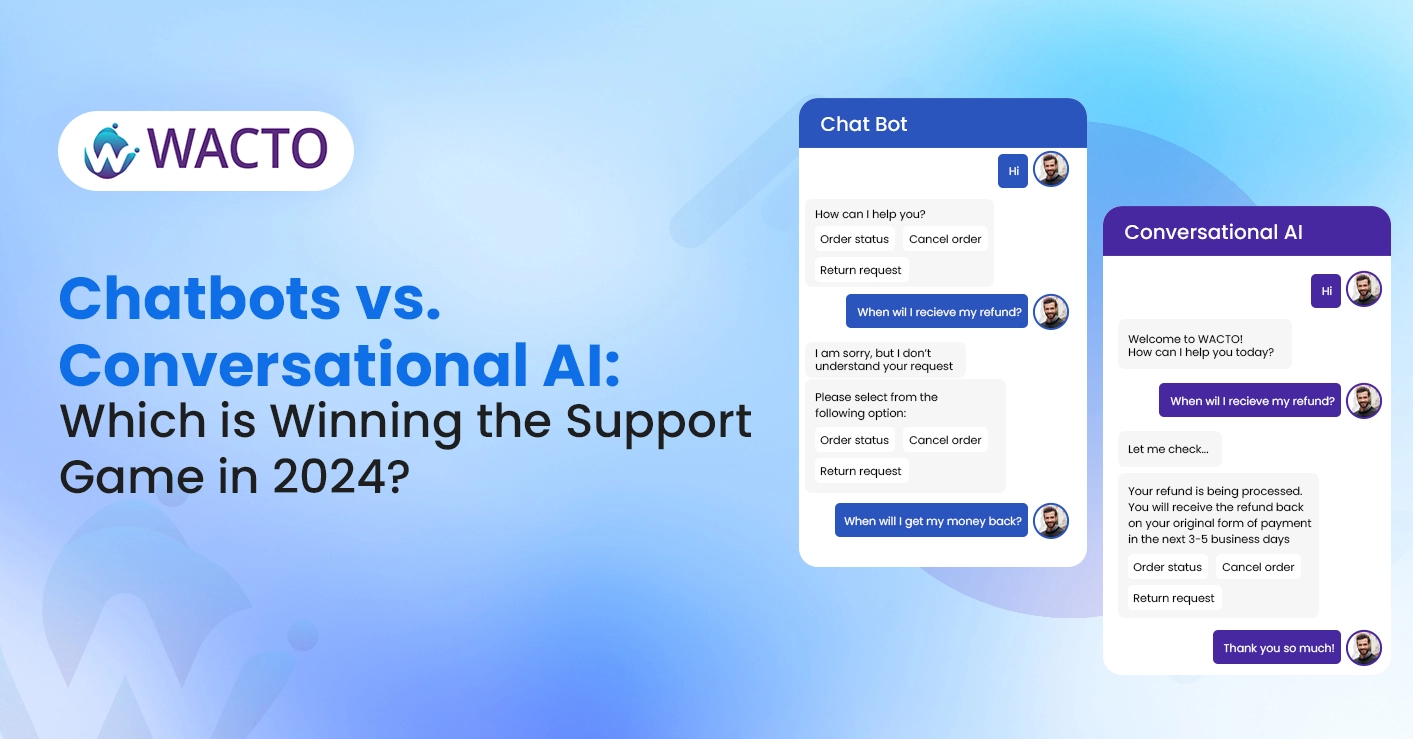
Chatbot vs Conversational AI: Which is Winning the Support Game in 2024?
As technology continues to evolve, businesses rapidly change the landscape of customer support. Two of the most revolutionary technologies in this field are chatbot vs conversational AI. Companies design them to enhance customer interactions, streamline processes, and ultimately improve the overall customer experience. But which one truly leads in the customer support game in 2024? In this blog, we will explore the key differences, advantages, and prospects of chatbots and conversational AI, and how WACTO’s cutting-edge solutions shape the future of customer support.
Understanding Chatbots and Conversational AI
Automated programs known as chatbots can interact with users through text or voice. Typically, they are rule-based and can handle simple queries by following predefined scripts. Businesses widely use chatbots for basic customer service tasks such as answering frequently asked questions, providing product information, and guiding users through standard processes.
Conversational Chatbots leverage advanced technologies such as natural language processing (NLP) and machine learning to understand, process, and respond to human language in a more sophisticated and human-like manner.
Conversational AI can manage more complex interactions, learn from past conversations, and adapt to provide more personalized and relevant responses.
Chatbots: The Foundation of Automated Support
Chatbots have been in use for quite some time and have seen substantial enhancements over the years. Their main advantage is their straightforwardness and effectiveness. Here are some key benefits:
- 24/7 Availability: Chatbots operate 24/7, offering continuous assistance for customers.
- Cost-Effective: Utilizing a chatbot service can decrease the need for a sizable customer support team, resulting in substantial cost savings.
- Instant Responses: Chatbots provide immediate responses, reducing waiting times and enhancing customer satisfaction.
- Consistency: Chatbots deliver consistent answers, ensuring that customers receive the same information regardless of when they ask.
- Scalability: Chatbots are capable of managing multiple queries simultaneously, making them well-suited for businesses that deal with high volumes of customer interactions.
Conversational AI: The Next Level of Customer Support
While chatbots have their strengths, conversational AI takes customer support to a whole new level. Here’s how conversational AI, including solutions like WACTO’s advanced platform, is transforming the support landscape:
- Advanced Understanding: Conversational AI can comprehend complex queries and context, providing more accurate and relevant responses.
- Personalization: By analyzing past interactions and customer data, conversational AI can tailor its responses to individual preferences and needs, enhancing conversational engagement.
- Learning and Adaptation: Conversational AI learns from each interaction, improving its performance over time and adapting to changing customer behaviors.
- Multi-Channel Support: Conversational AI can integrate with various communication channels, including social media, email, and messaging apps, offering a seamless omnichannel experience.
- Emotional Intelligence: Advanced conversational AI can discern the sentiment conveyed in customer messages and offer empathetic responses, thereby enhancing the overall customer experience.
WACTO Conversational Chatbot: Bridging the Gap
WACTO is at the forefront of combining the best of both worlds by offering a powerful chatbot service infused with conversational AI capabilities. Here’s how WACTO is revolutionizing customer support:
- Versatile Solutions: WACTO provides customizable solutions that cater to diverse business needs, from simple chatbots to sophisticated conversational AI systems.
- Enhanced Conversational Marketing: By leveraging conversational AI, WACTO’s platform can drive AI conversational marketing efforts, engaging customers in meaningful and personalized ways.
- Conversational Commerce: WACTO’s AI-powered chatbots can assist customers throughout their shopping journey, from product discovery to purchase, boosting sales and customer satisfaction.
- Seamless Integration: WACTO’s solutions can integrated with various platforms and channels, ensuring a cohesive and streamlined customer support experience.
- Data-Driven Insights: WACTO’s platform provides valuable insights and analytics, helping businesses understand customer behavior and optimize their support strategies.
The Future of Customer Support: Chatbots or Conversational AI?
As we progress into 2024, businesses are blurring the line between chatbot vs conversational AI.They are recognizing the value of combining the strengths of both technologies to deliver superior customer support. Chatbots will continue to serve as the foundation for automated support, efficiently and cost-effectively handling routine queries. They are ideal for businesses that want to provide consistent, round-the-clock assistance without significant investment. Conversational AI, on the other hand, will drive the future of customer engagement by offering more intelligent, personalized, and empathetic interactions. Businesses that adopt conversational AI will position themselves better to meet the evolving expectations of their customers and deliver exceptional experiences.
Conclusion
In the battle between chatbot vs conversational AI, the real winners are businesses and customers. By leveraging the strengths of both technologies, companies can enhance their customer support capabilities, drive engagement, and foster loyalty.
WACTO is leading the charge in this transformation by offering innovative solutions that blend the efficiency of chatbots with the intelligence of conversational AI chatbots. Whether it’s through conversational commerce, engagement, marketing, or support, WACTO’s platform is designed to help businesses stay ahead of the curve and deliver outstanding customer experiences.
Looking ahead beyond 2024, the convergence of chatbot vs conversational AI will continue to reshape the customer support landscape. Businesses that embrace these technologies will be well-equipped to win the support game and build lasting relationships with their customers.





